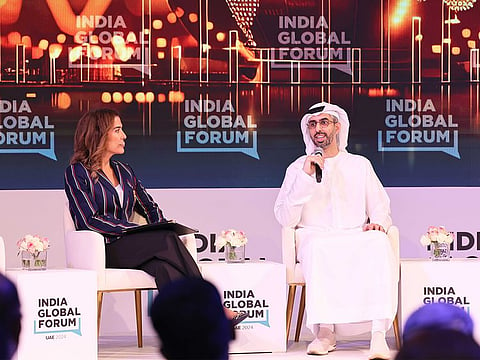Al Olama: Why AI is a game-changer for the UAE
Omar Sultan Al Olama outlines the UAE's use of AI and partnerships to drive innovation

In a world where technology is reshaping economies, Omar Sultan Al Olama, Minister of State for Artificial Intelligence, Digital Economy, and Remote Work Applications, is at the forefront pushing the UAE’s ambitious digital transformation. Appointed as the world's first Minister of AI in 2017, Al Olama has led the UAE’s strategy to leverage artificial intelligence and digital tools to revolutionize government services, foster economic resilience, and position the country as a global leader in innovation.
At a session on the opening day of the India Global Forum’s (IGF) flagship Middle East & Africa 2024 (ME&A 2024) on Monday, held at Dubai’s Taj Hotel Business Bay, Al Olama highlighted the UAE’s achievements, including being ranked fifth globally in artificial intelligence readiness, and how emerging economies can leapfrog traditional development models.
From the seamless use of AI in airports to fostering a tech-savvy workforce, he spoke about how a relentless focus on improvement drives the UAE’s success. He also touched on investments, the importance of critical thinking in a rapidly evolving tech landscape, and the balance governments must strike when riding technology’s waves.
On how emerging economies can leapfrog traditional growth models through digital transformation,
Omar Sultan Al Olama said: “The UAE’s journey is at an exciting juncture. We launched our National Strategy for Artificial Intelligence in 2017, focusing on government use of AI. Today, halfway through the strategy, we’re already seeing remarkable results. Initially, many doubted that a small nation could lead in AI. Yet, a recent report ranked the UAE fifth globally in AI readiness, just behind the US, China, the UK, and India.”
“For emerging economies, AI is a game-changer. It enables better services without the constraints of conventional development. For example, in our airports, AI allows for seamless immigration processes where travelers simply walk through smart gates; no need for passports or long waits. It’s this invisible efficiency that reflects technology done right.”
On the key factors in building investment ecosystems that drive innovation and growth.
“We never feel satisfied with what we have. We constantly focus on what we lack and how to improve. For example, the UAE recently issued its one-millionth trade license. This milestone reflects the vast number of businesses operating here. However, these companies aren’t just targeting the UAE; they view it as a gateway to the broader region and the world.
“Our Comprehensive Economic Partnership Agreements (CEPA) are critical in this regard. The one we signed with India, for instance, is a paradigm shift that opens enormous market opportunities. Yet, we still have a long way to go. Continuous iteration and expansion remain our priorities.”
On Moody’s recently ranking of the UAE to be among the top five fastest-growing economies.
“ This success reflects several factors. First, visionary leadership that invests responsibly and plans far ahead. Second, the UAE’s unique identity as a global hub. Unlike most cities tied to a single nation, Dubai is a “world city,” built by people from all corners of the globe who have invested their expertise and resources.
Ultimately, the UAE’s growth is a testament to its ability to unite diverse communities in pursuit of a shared vision. This inclusivity and ambition drive our resilience and success. “


